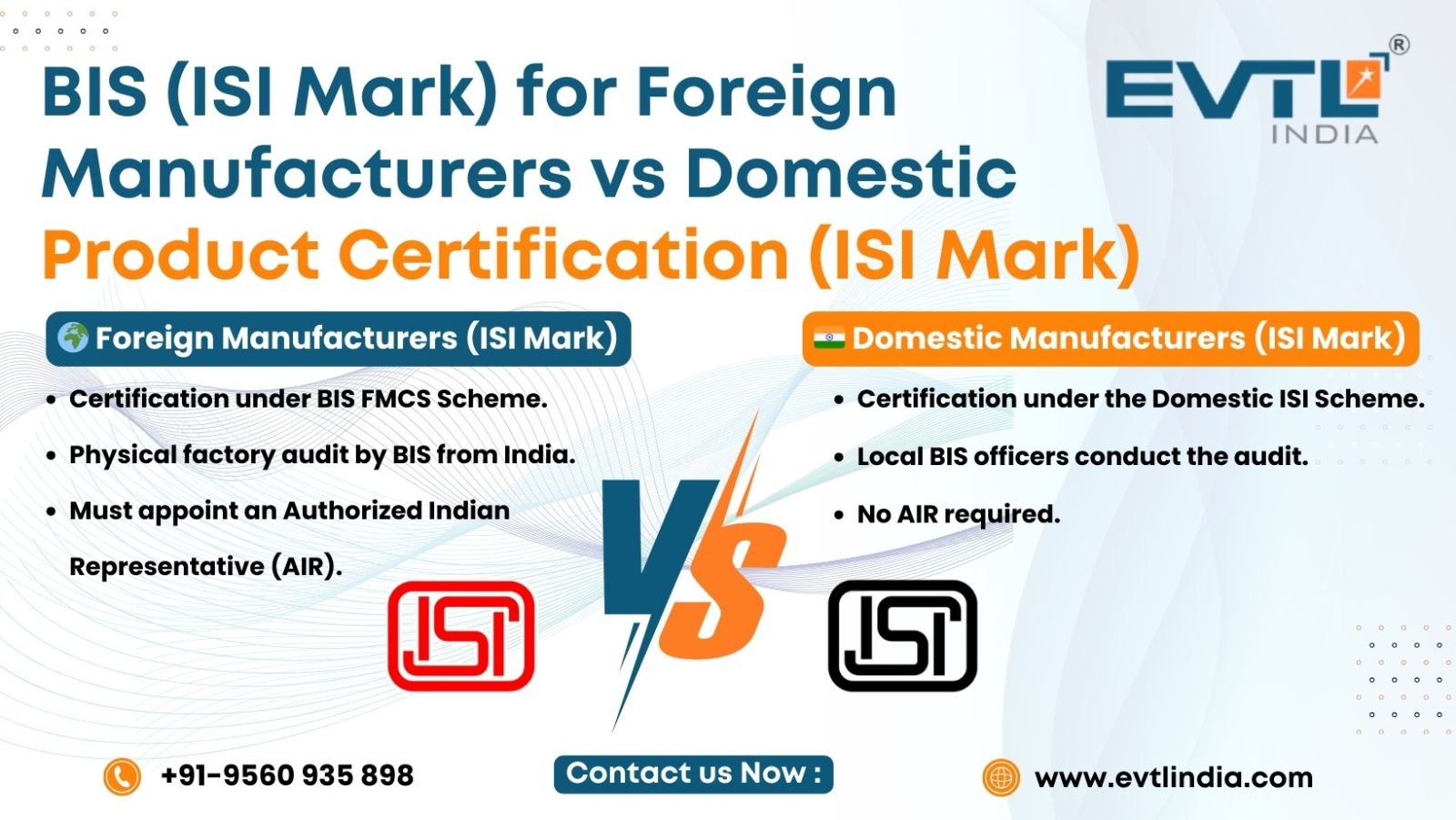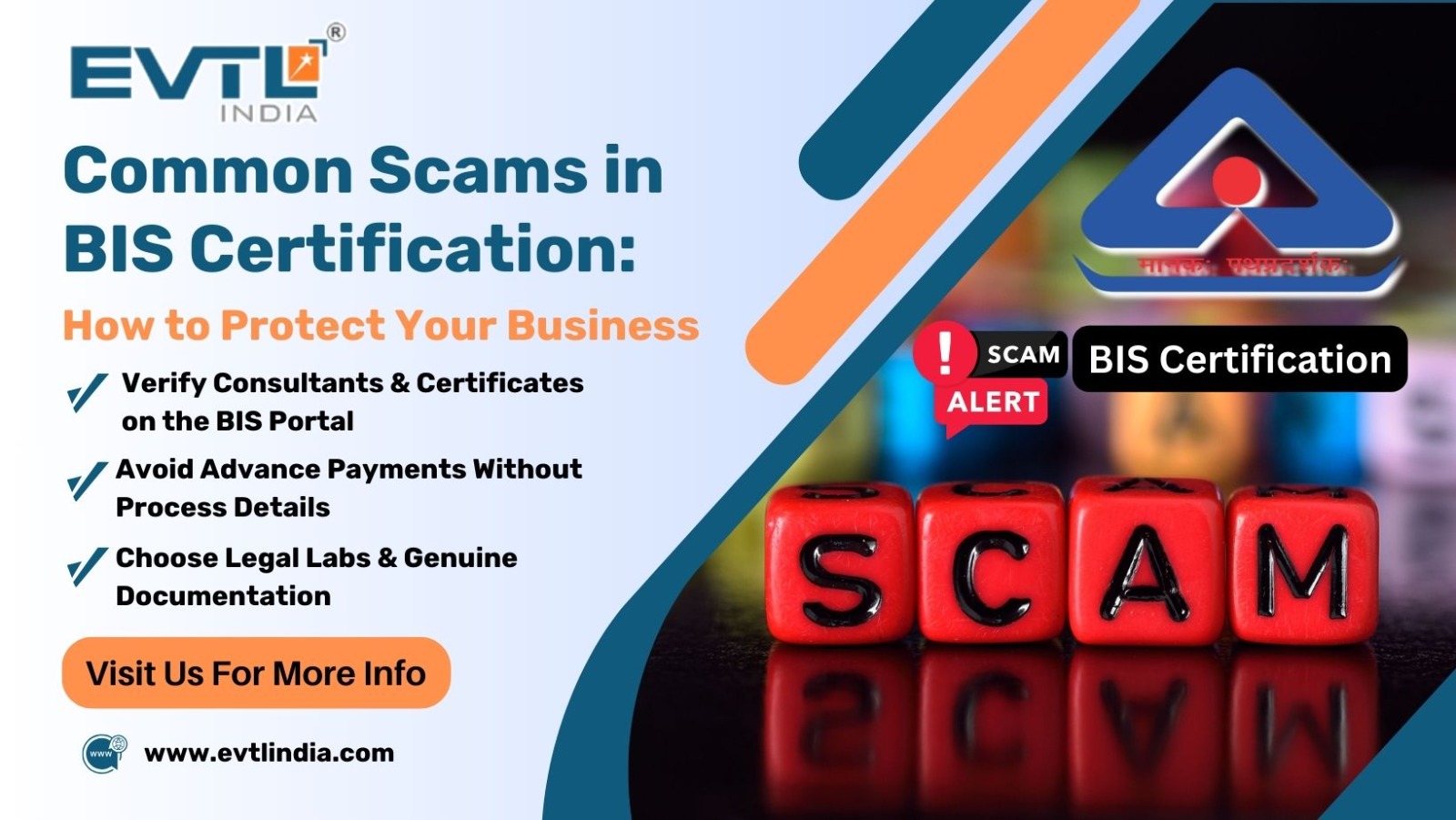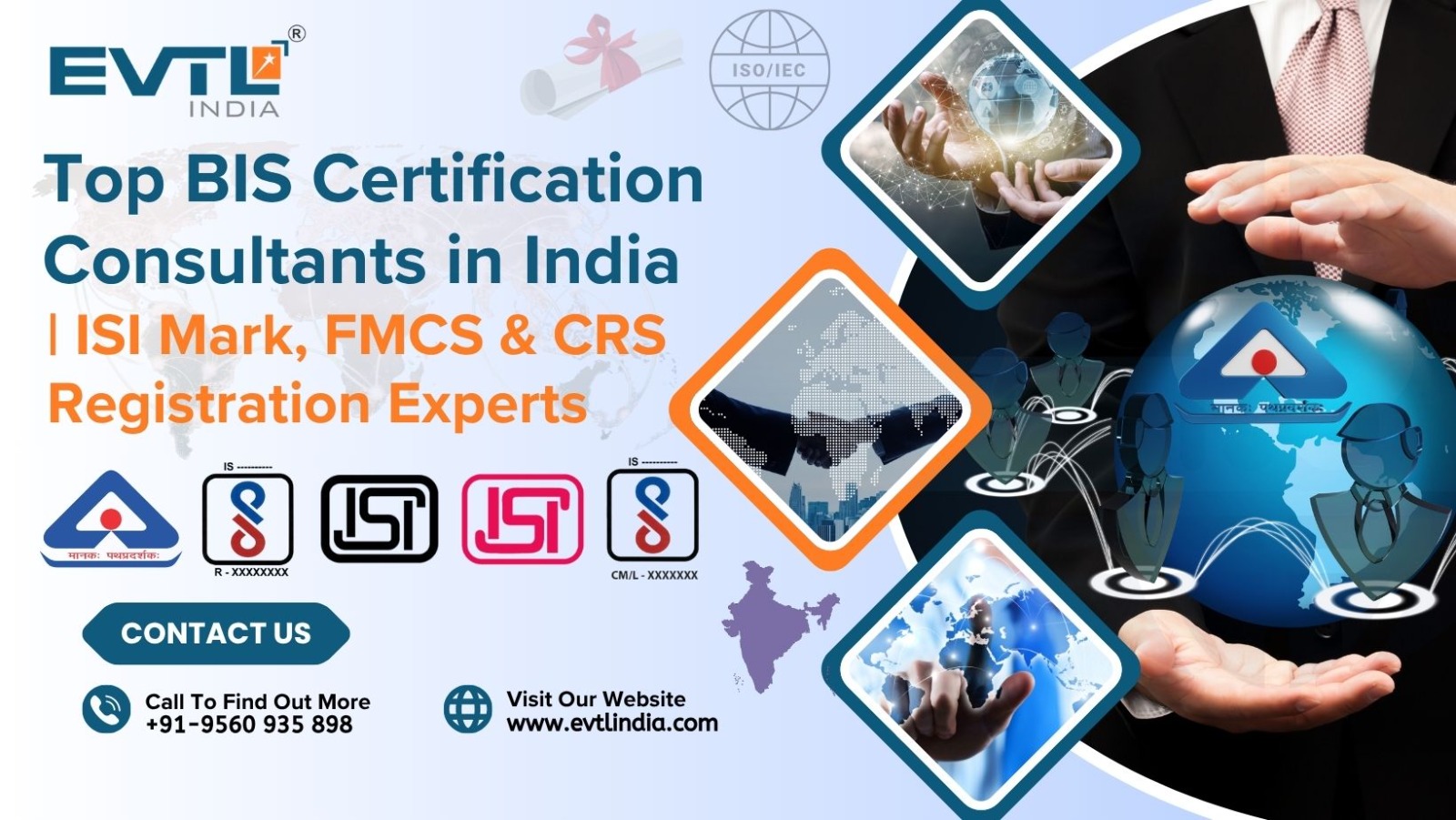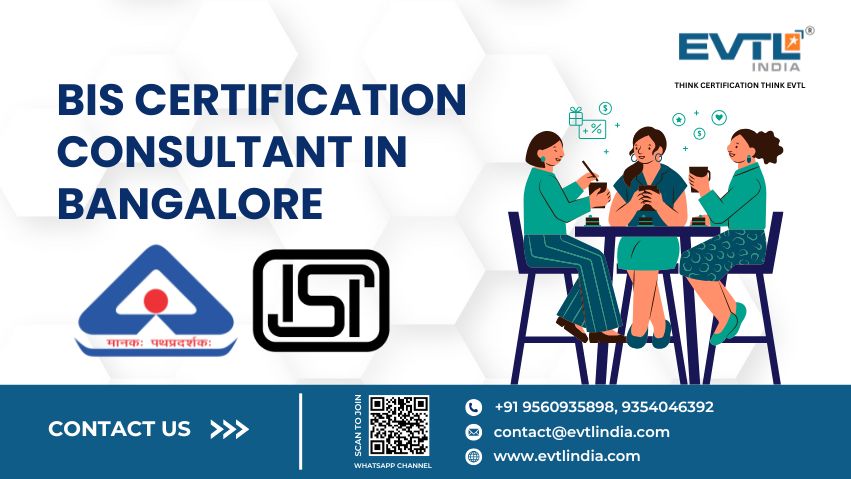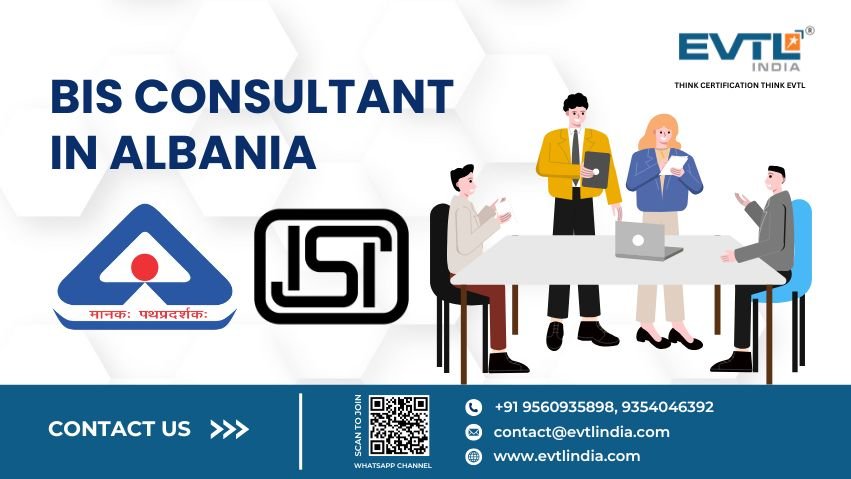Get A Quote
BIS Certification for Import - Process, Documents, Fees
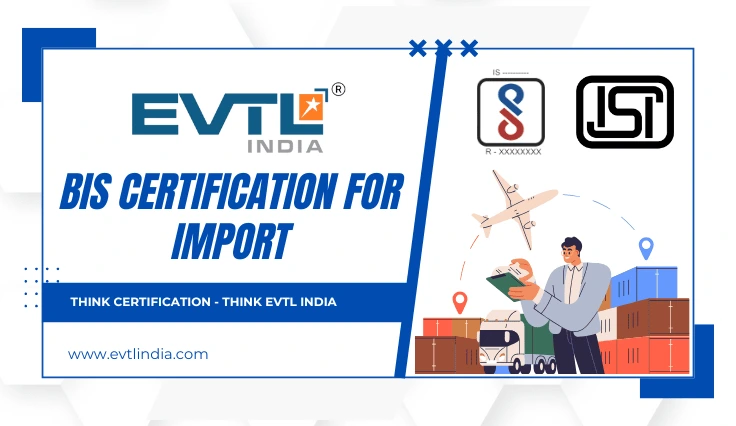
- Introduction
India is one of the world's fastest-growing consumer markets. Therefore, in order to protect both the consumer and industry, it has made stringent requirements of quality and safety a legal necessity. The root of these regulations is BIS (Bureau of Indian Standards), India's national standards body. BIS certification for imports is therefore often essential before foreign manufacturers and importers can legally import and sell their products into India. This is particularly true of goods that fall under Quality Control Orders (QCOs), where certification ensures compliance with Indian Standards.
This manual tells you all that you need to know about BIS certification for import: what it is, why you need it, the FMCS and CRS certification difference, and the Authorized Indian Representative's (AIR) important role. Give a step-by-step guide for certification, documentation, and the timing you should take, recent regulatory changes, obstacles and solutions and some practical tips for 2025 compliance.
What is BIS & the CRS/ISI Mark?
- Bureau of Indian Standards (BIS): The official body under the Ministry of Consumer Affairs which determines and enforces product standards within India.
- ISI Mark: shows that a product has been inspected and meets the requirements for Indian Standards. The symbol of confidence. This is commonly used on non-electronics products.
- CRS Mark: A mark of distinction given to electronic and IT products registered CODI under the Comishment Registration Scheme.
Both marks stand for quality, safety, and reliability. These are three critical considerations in any imported product destined for the Indian market.
Why is BIS Certification Mandatory for Imports?
● Consumer Safety & Quality Assurance :
● Compliance with Government QCOs:
● Legal Requirement & Customs Clearance : Without certification, goods may be detained or even rejected at ports in India.
● Market Access & E-Commerce Regulations:
● Brand Reputation & Consumer Trust: BIS certification builds consumer confidence and improves credibility in the Indian marketplace.
BIS Certification Schemes: FMCS vs CRS
- Foreign Manufacturer Certification Scheme (FMCS) :
- Applies to offline non-IT products and services.
- This certification allows the manufacturer to switch over to the ISI mark.
- It requires factory inspections and testing at a laboratory that is accredited by BIS.
- For foreign manufacturers the licensing can be obtained directly, but they have to assign a representative with air (an authorized Indian representative).
- Compulsory Registration Scheme (CRS) :
Applicable to electronics and IT products.
Involves testing at laboratories accredited by the Bureau of Indian Standards (BIS).
The certificate enables the holder to use the CRS Standard Mark which signifies that they have met all requirements set by BIS.
Factory inspection is required for all new products no matter what the nature of the product.
Step-by-Step BIS Certification Process for Imports :
A. FMCS Certification Process (ISI Mark Products)
Defines the related IS standard for the product.
You will need to provide various documents such as your company profile, product details, test reports and quality control records with new factory licensed.
Via AIR on the BIS portal, submit your application.
Factory Audit by BIS – the factory actually does exist as stated and products produced there are of adequate quality to be marked with an ‘ISI’ or equivalent label (if relevant).
The Tests done in BIS-approved laboratory.
License granted – manufacturer may now begin using the ISI mark.
B. CRS Certification Process (Electronics/IT Products)
Product Testing in a BIS-recognized laboratory.
Submit Application Online with the test report and documents.
BIS confirms the information submitted by doing a spot check.
Certificate Grant – CRS Standard Mark is issued.
Key Documents Required for BIS Import Certification:
Completed BIS application form.
Company incorporation certificate.
Factory license and layout plan.
Product specifications and process flow chart.
Test reports from BIS-recognized labs.
Authorized Indian Representative (AIR) details.
Quality control documents (inspection records, audits, etc.).
Timelines & Validity
- FMCS License: Generally takes 6–9 months, since it involves foreign factory inspections.
- CRS Certificate: Typically issued within 4–6 weeks, provided testing and documents are complete.
- Validity: Both licenses are valid for 2 years, after which they can be renewed.
Recent Regulatory Updates (2024–2025)
- Manakonline portal, through a One-Time Registration (OTR), over 400 kinds of machinery and electrical equipment from 28 August of 2025 is required to be registered.
- QCOs Coverage: Including footwear and furniture, more than 750 new types of products—both indigenous products and imported foreign goods—owe their certification to the BIS.
- Steel Rule: Indian Steel makers are now required to buy their raw materials with BIS certification. This will place an additional financial burden on small and medium enterprises for raw material supply.
Common Challenges for Importers
- Lengthy Documentation – mistakes or missing papers cause delays.
- Factory Audit Complexity – costly and time-consuming for foreign manufacturers.
- Constant Regulatory Updates – keeping up with QCOs and BIS rules is difficult.
- High Compliance Costs – especially in steel and heavy machinery sectors.
FAQs: BIS Certification for Imports
Q1. Can an importer directly apply for BIS certification?
No, the license is always granted to the manufacturer. Importers can coordinate via an AIR.
Q2. Is BIS certification required if my product is not on the QCO list?
No, but voluntary certification is encouraged to boost consumer trust.
Q3. How long is the BIS certification valid?
Certificates are generally valid for 2 years and can be renewed.
Q4. Can testing be done outside India?
No, all testing must be carried out in BIS-recognized laboratories in India.
Q5. Do all product variants require separate licenses?
Yes, in most cases, each variant must be separately licensed.
Conclusion
In the realm of imports, obtaining BIS certification goes beyond a mere legal requirement. Once certified, products receive simplified customs clearance, international credibility and consumer confidence in its quality. But the procedure is complicated involving multiple steps such as factory audit, experiment, and checking consistency. Foreign manufacturers and importers therefore need guidance from experts who understand BIS certification processes if they are to avoid delays and rejections of their products. For foreign manufacturers and importers, expert guidance is crucial to avoid delays and rejections. The process can be complex however, involving multiple steps such as factory audits, testing, and compliance checks.
You can contact us via email at contact@evtlindia.com or by phone at 9560935898. Feel free to get in touch with us anytime for the support you need.
BIS ISI Mark Certification | BIS-CRS Certification | EPR E-WASTE | WMI Registration | BIS Certification For Footwear | TAC & IMEI Registration | BIS FMCS Page | TEC | EPR Registration for Plastic Waste Management | EPR Registration for Battery Waste Management | EPR Registration For Used Oil | EPR Registration for Tyre Waste Management | WPC ETA License | NOC | LMPC | Legal Metrology | Trademark Registration | ISO Certification | EMI-EMC Test | Toys | GEM Registration | EPCG Scheme | LM 79 & LM 80 | ROHS Approval | CDSCO Registration | RF Testing | IP Rating Test | MSME & NSIC Registration | BIS Certificate for Conformity | BIS Scheme-X Certification | Hallmark Registration | Laboratory Recognition Scheme | ECO-MARK Certification | RDSO | CE Certification | List Of Equipments | US FDA Registration | Lab Setup & Lab Equipment |
Free Call Back
Why Choose EVTL INDIA
Expertise in Indian Regulatory Standards
End-to-End Support
Trusted by Top Indian & Global Brands
Fast Processing & Transparent Pricing
Strong Liaison with Indian Authorities
Company Profile
